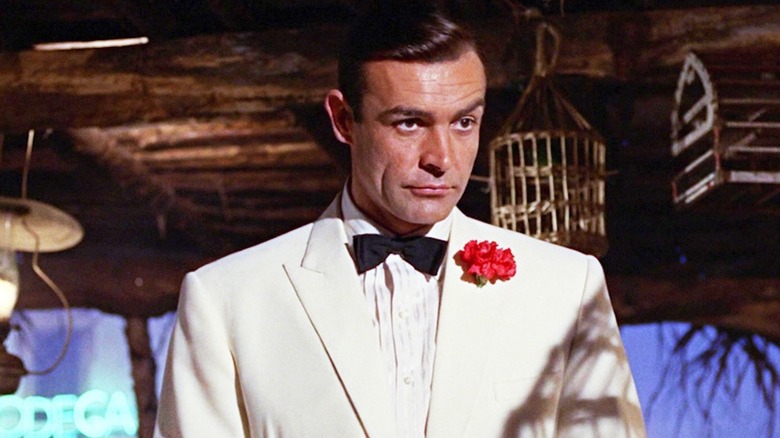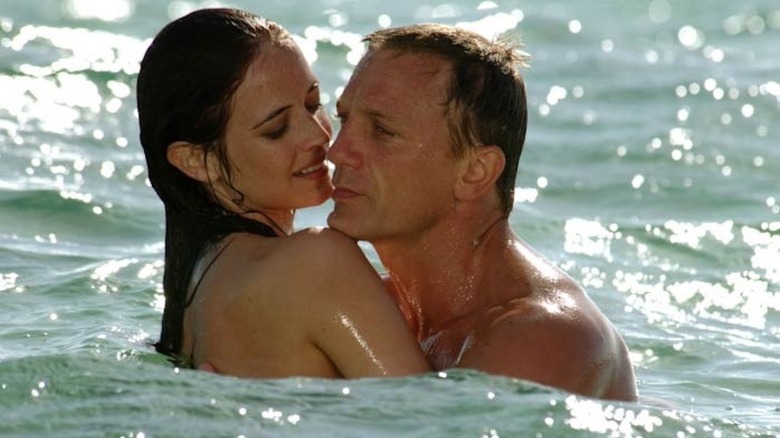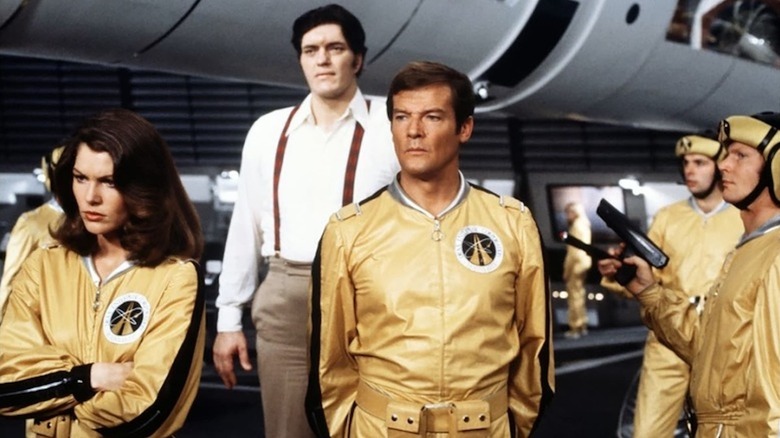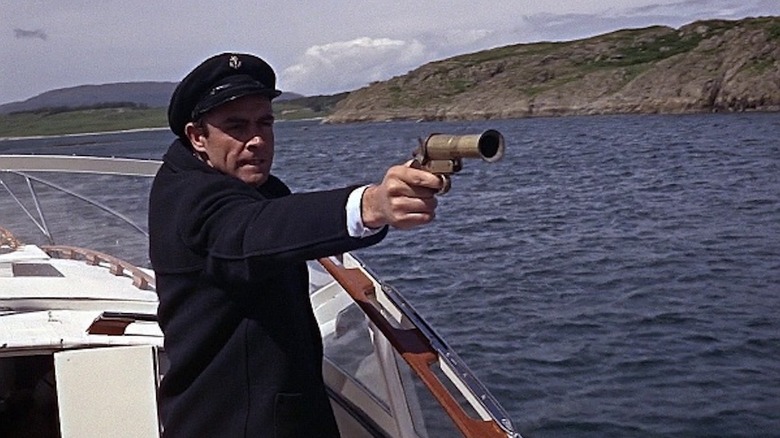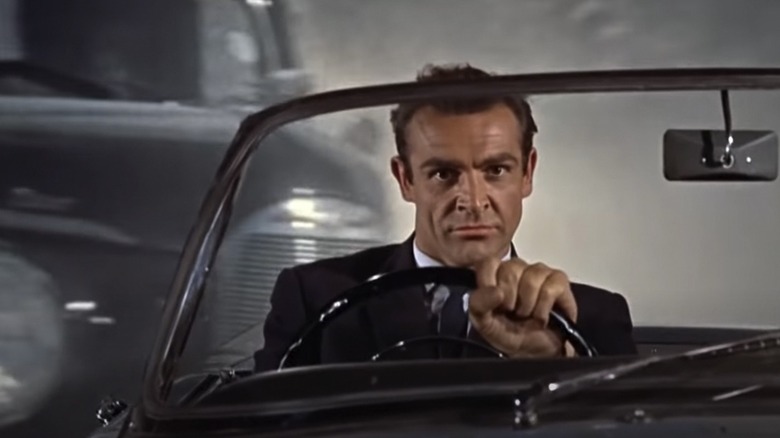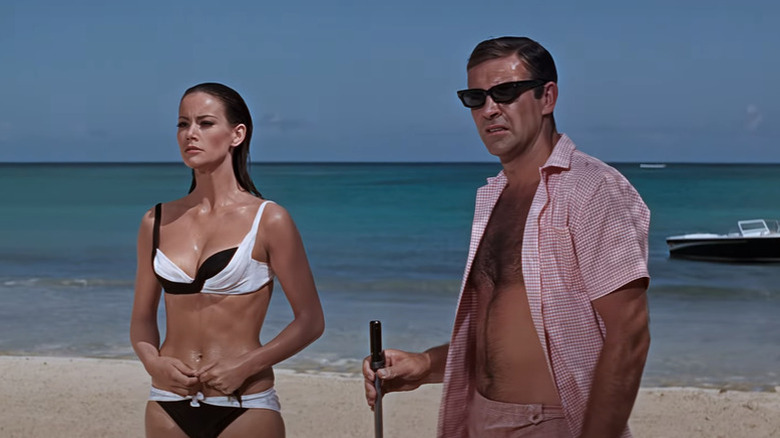The 5 Best James Bond Books That Hardcore Movie Fans Need To Read
Ian Fleming did not initially have the highest of hopes for James Bond. When the former British Naval Intelligence officer knocked out "Casino Royale" in early 1952 at his Goldeneye estate in Jamaica, he described it as his "dreadful oafish opus." Fleming was also somewhat down on his protagonist, telling The New Yorker in 1961, "When I wrote the first one in 1953, I wanted Bond to be an extremely dull, uninteresting man to whom things happened; I wanted him to be a blunt instrument ... when I was casting around for a name for my protagonist I thought, 'By God, [James Bond] is the dullest name I ever heard.'"
This must come as news to people who've only ever known James Bond through the movies. As portrayed by Sean Connery, George Lazenby, Roger Moore, Timothy Dalton, Pierce Brosnan, and Daniel Craig, 007 was anything but a "blunt instrument." Okay, he wasn't exactly scalpel-like in his spycraft; he was quick to anger, while his womanizing ways got him needlessly in hot water at times. But he was always a dashing figure — breathtakingly lethal, quick-witted, and aspirational in his fashion sense. There's a reason this character has endured in cinema for over 60 years.
The Bond of the books is a different beast. Fleming gets us on the character's wavelength, and it's not a terribly comfortable place to be. Bond is a morose trained killer, a chauvinist, and a deeply unpleasant alcoholic. He's obviously quite capable, but he doesn't take much joy in his work. He's much more ruthless, which is why fans often zero in on Dalton's portrayal of a truly ticked-off Bond in "License to Kill" as the closest the films have ever come to capturing the 007 of the books.
I don't mean to make Fleming's novels sound like a chore to read. Though his Bond isn't the inveterate quipster that the films made him out to be, the author mostly spins exciting, semi-plausible yarns that you can tear through in a matter of days. If you've always wondered whether these books are for you, I usually recommend that you tackle them chronologically. However, if you just want to feast on the cream of the crop, these are the five James Bond books you must read.
Casino Royale
Fleming's first 007 tale kicks off with one of the best opening paragraphs ... ever, really:
"The scent and smoke and sweat of a casino are nauseating at three in the morning. Then the soul-erosion produced by high gambling — a compost of greed and fear and nervous tension — becomes unbearable and the senses awake and revolt from it."
Needless to say, there won't be any parkour or tricked-out Aston Martins in this slender volume. Fleming's biggest problem as a novelist is that he was so dialed into his character and the new Cold War reality of his surroundings (and hatred of it) that he could never re-summon the muse in as bracing a fashion. There's nothing dreadful or oafish about this hard-bitten opus. It wastes no time thrusting us into Bond's mission, which is to bankrupt the repulsive SMERSH agent Le Chiffre (he's so vividly imagined that you will never once conjure up the image of Mads Mikkelsen) via a high-stakes game of baccarat (not Texas Hold 'Em, which was featured in the film adaptation because it was popular on ESPN at the time).
The most compelling element of "Casino Royale" is Vesper Lynd, a Soviet MI6 asset who is actually a double-agent for the USSR. As in the film, Bond and Lynd become romantically involved, which leads to the inevitable betrayal. Though Bond talks a tough game about not being affected by her fate, she does come up in future books. Fleming's Bond may be a bastard, but there's a trace of warmth lurking under the ice sheet of his heart.
Moonraker
If you only know the James Bond movies, you're probably surprised to find this novel on my list. And when you take into consideration that it was written in 1955, you must absolutely be wondering how Fleming somehow anticipated that it would benefit the then non-existent series of films based on his books if one of them happened to exploit a sci-fi phenomenon that was 22 years off in the future (i.e. "Star Wars").
Fleming was no Nostradamas, and "Moonraker," the silliest Bond movie, has almost nothing to do with the book aside from its title and the name of its main villain. At 255 brisk pages, it's my pick for the most entertaining Bond novel of the bunch, and it's so different from the movie that I don't want to spoil its twists and turns for you. This Drax is a shadowy industrialist whose mysterious past makes his plan to kickstart England's nuclear weapons program all the more ambitious. Though I joke about Fleming's less than 20-20 foresight, he was utterly spot-on in playing up the West's unease with entrusting its rocketry ambitions to ex-Nazi scientists and eerily prescient about the dangers of a wildly wealthy individual controlling the fate of the free world. What he couldn't predict was that you don't need to be an evil genius like Drax to upset the global balance of power. It's also worth noting that the ending of "Moonraker" runs hilariously counter to the conclusion of just about every Bond movie.
From Russia with Love
Many Bond fans consider "From Russia with Love" to be the film franchise's best outing, but the 1957 novel nearly served as the hero's swan song. Just as Sir Arthur Conan Doyle tried and failed to kill Sherlock Holmes in "The Final Problem," Fleming finished the fifth novel with the nefarious Rosa Klebb kicking Bond with a poisoned blade. He appears to be a goner — and might've been had Fleming not been persuaded to keep his publishing sensation up and running.
Fleming nimbly sets up a SMERSH scheme to assassinate Bond and makes it clear that the MI6 agent is up against formidable opponents every step of the way. Donovan "Red" Grant is one of Fleming's most diabolical creations: a savage British army deserter who's essentially a serial killer. Interestingly, the way he's written by the author gives the train compartment fistfight in the film, which is not in the book, an added charge. The novel and movie intriguingly complement each other in other ways, making this the one Bond book you're most likely to revisit. It also has the distinction of being one of President John F. Kennedy's favorite novels.
Dr. No
If you're looking for a good Fleming novel that indulges in the unrealistic exploits of the Bond movies, "Dr. No" should treat you just splendidly. 007 is sent to a fictional Caribbean Island to investigate the disappearance of two MI6 agents, but, before he gets there, he's nearly offed by a deadly centipede that's been planted in his bed (much creepier than the tarantula crawling over a glass plate, due to Connery's severe aversion to spiders, in the movie). When he gets to the fictional Crab Key, he's attacked by a dragon — i.e. a flame-throwing vehicle that kills off Bond's contact.
We soon learn No is in cahoots with the Russkies and plans to thwart the United States' missile launches in Cape Canaveral via an underground system. The metal-handed No is much more sadistic in the book. He subjects Bond to a torturous obstacle course that ends with our protagonist doing battle with a giant squid. Ironically, the novel is a good deal wilder than the movie, but it's the toned-down silliness of the film's finale that whetted audiences' appetites for gadgetry and borderline sci-fi set pieces. Had the film series kicked off with "From Russia with Love," the franchise might've gone in a completely different direction.
Thunderball
Fleming's "Thunderball" is not actually in my personal top five as a standalone read, but as the first chapter in the "Blofeld Trilogy," it's the installment that will lead you to my favorite Fleming novel.
This 1961 book introduces us to SPECTRE, a criminal organization that is populated with former Nazis but not aligned with any country. Heading in this direction freed Fleming from having to explicitly deal with the U.S.-U.S.S.R. saber-rattling (which shook up the world's living rooms two years later when every person on the planet watched helplessly as the Cuban Missile Crisis unfolded); instead, he was able to introduce elements of nuclear blackmail that, while unsettling, were grounded in pure, mildly innocuous fiction. "Thunderbolt" is a solid, pulse-quickening read that confidently lays the groundwork for the second installment of Fleming's "Blofeld Trilogy," the surprisingly melancholy and tragic "On Her Majesty's Secret Service." This book, which would eventually become the finest Bond movie to date (featuring a brilliant performance by Diana Rigg), doesn't just humanize the typically dour character, it breaks him down. The final entry in the trilogy, "You Only Live Twice," is terrific, too, but "On Her Majesty's Secret Service" is the heartbreaker you need to experience if you're into Bond, and you've got to read "Thunderball" to get there.
